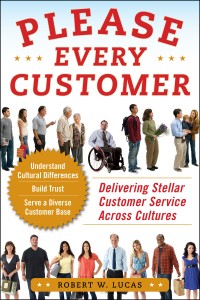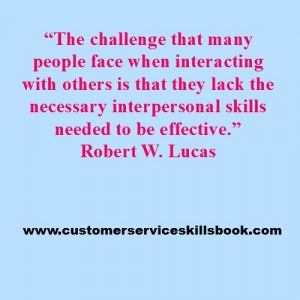The Role of Gestures in Positive Customer Service
The use of nonverbal communication with your head, hands, arms, and shoulders to accentuate verbal messages can add color, excitement, and enthusiasm to your interactions with customers. Using physical movements naturally during a conversation may either help make a point or result in added credibility.
Typically, movements or gestures are designed to gain and hold attention (e.g. waving a hand to attract the attention of someone), clarify or describe further (e.g. holding up one finger to indicate the number 1), or emphasize a point (e.g. pointing a finger while angrily making a point verbally).
Open, flowing gestures (e.g. gesturing with arms, palms open and upward, out and away from the body) encourage listening and help explain messages to customers. On the other hand, closed, restrained movements (e.g. tightly crossed arms, clenched fists, hands in pockets, hands or fingers intertwined and held below waist level or behind the back) could send a message of coolness, insecurity, or disinterest.
One important point to remember in a multicultural world is that nonverbal cues are not universal and a gesture in one country or culture could take on an entirely different meaning in another. Take some time to research common nonverbal cues around the world before using them in public.
The key to effective nonverbal communication is to make gestures seem natural. If you do not normally use gestures when communicating, you may want to practice in front of a mirror until you feel relaxed and the gestures complement your verbal messages without distracting.
For additional ideas and strategies on using nonverbal communication effectively when interacting with customers, get a copy of Customer Service Skills for Success. For suggestions on interacting effectively with customers from different backgrounds, check out Please Every Customer: Delivering Stellar Customer Service Across Cultures.
About Robert C. Lucas
Bob Lucas has been a trainer, presenter, customer service expert, and adult educator for over four decades. He has written hundreds of articles on training, writing, self-publishing, and workplace learning skills and issues. He is also an award-winning author who has written thirty-seven books on topics such as, writing, relationships, customer service, brain-based learning, and creative training strategies, interpersonal communication, diversity, and supervisory skills. Additionally, he has contributed articles, chapters, and activities to eighteen compilation books. Bob retired from the U.S. Marine Corps in 1991 after twenty-two years of active and reserve service.
Make Money Writing Books: Proven Profit Making Strategies for Authors by Robert W. Lucas at Amazon.com.
The key to successfully making money as an author and/or self-publisher is to brand yourself and your company and to make yourself and your book(s) a household name. Part of this is face-to-face interaction with people at trade shows, library events, book readings, book store signings, blogging or guest blogging on a topic related to their book(s). Another strategy involves writing articles and other materials that show up online and are found when people search for a given topic related to a topic about which the author has written.
If you need help building an author platform, branding yourself and your book(s) or generating recognition for what you do, Make Money Writing Books will help. Bob’s popular book addresses a multitude of ideas and strategies that you can use to help sell more books and create residual and passive income streams. The tips outlined in the book are focused to help authors but apply to virtually any professional trying to increase personal and product recognition and visibility.






